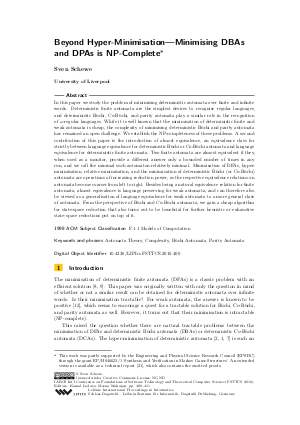Beyond Hyper-Minimisation---Minimising DBAs and DPAs is NP-Complete
Author Sven Schewe
-
Part of:
Volume:
IARCS Annual Conference on Foundations of Software Technology and Theoretical Computer Science (FSTTCS 2010)
Part of: Series: Leibniz International Proceedings in Informatics (LIPIcs)
Part of: Conference: IARCS Annual Conference on Foundations of Software Technology and Theoretical Computer Science (FSTTCS) - License:
 Creative Commons Attribution-NonCommercial-NoDerivs 3.0 Unported license
Creative Commons Attribution-NonCommercial-NoDerivs 3.0 Unported license
- Publication Date: 2010-12-14
File

PDF
LIPIcs.FSTTCS.2010.400.pdf
- Filesize: 421 kB
- 12 pages
Document Identifiers
Subject Classification
Keywords
- Automata Theory
- Complexity
- Büchi Automata
- Parity Automata
Metrics
- Access Statistics
-
Total Accesses (updated on a weekly basis)
0PDF Downloads0Metadata Views
Abstract
In this paper we study the problem of minimising deterministic automata over finite and infinite words. Deterministic finite automata are the simplest devices to recognise regular languages, and deterministic \buchi, \cobuchi, and parity automata play a similar role in the recognition of $\omega$-regular languages. While it is well known that the minimisation of deterministic finite and weak automata is cheap, the complexity of minimising deterministic \buchi\ and parity automata has remained an open challenge. We establish the NP-completeness of these problems. A second contribution of this paper is the introduction of almost equivalence, an equivalence class for strictly between language equivalence for deterministic \buchi\ or \cobuchi\ automata and language equivalence for deterministic finite automata. Two finite automata are almost equivalent if they, when used as a monitor, provide a different answer only a bounded number of times in any run, and we call the minimal such automaton relatively minimal. Minimisation of DFAs, hyper-minimisation, relative minimisation, and the minimisation of deterministic \buchi\ (or \cobuchi) automata are operations of increasing reduction power, as the respective equivalence relations on automata become coarser from left to right. Besides being a natural equivalence relation for finite automata, almost equivalence is language preserving for weak automata, and can therefore also be viewed as a generalisation of language equivalence for weak automata to a more general class of automata. From the perspective of \buchi\ and \cobuchi\ automata, we gain a cheap algorithm for state-space reduction that also turns out to be beneficial for further heuristic or exhaustive state-space reductions put on top of it.
Cite As Get BibTex
Sven Schewe. Beyond Hyper-Minimisation---Minimising DBAs and DPAs is NP-Complete. In IARCS Annual Conference on Foundations of Software Technology and Theoretical Computer Science (FSTTCS 2010). Leibniz International Proceedings in Informatics (LIPIcs), Volume 8, pp. 400-411, Schloss Dagstuhl – Leibniz-Zentrum für Informatik (2010)
https://doi.org/10.4230/LIPIcs.FSTTCS.2010.400
BibTex
@InProceedings{schewe:LIPIcs.FSTTCS.2010.400,
author = {Schewe, Sven},
title = {{Beyond Hyper-Minimisation---Minimising DBAs and DPAs is NP-Complete}},
booktitle = {IARCS Annual Conference on Foundations of Software Technology and Theoretical Computer Science (FSTTCS 2010)},
pages = {400--411},
series = {Leibniz International Proceedings in Informatics (LIPIcs)},
ISBN = {978-3-939897-23-1},
ISSN = {1868-8969},
year = {2010},
volume = {8},
editor = {Lodaya, Kamal and Mahajan, Meena},
publisher = {Schloss Dagstuhl -- Leibniz-Zentrum f{\"u}r Informatik},
address = {Dagstuhl, Germany},
URL = {https://drops.dagstuhl.de/entities/document/10.4230/LIPIcs.FSTTCS.2010.400},
URN = {urn:nbn:de:0030-drops-28816},
doi = {10.4230/LIPIcs.FSTTCS.2010.400},
annote = {Keywords: Automata Theory, Complexity, B\"{u}chi Automata, Parity Automata}
}
